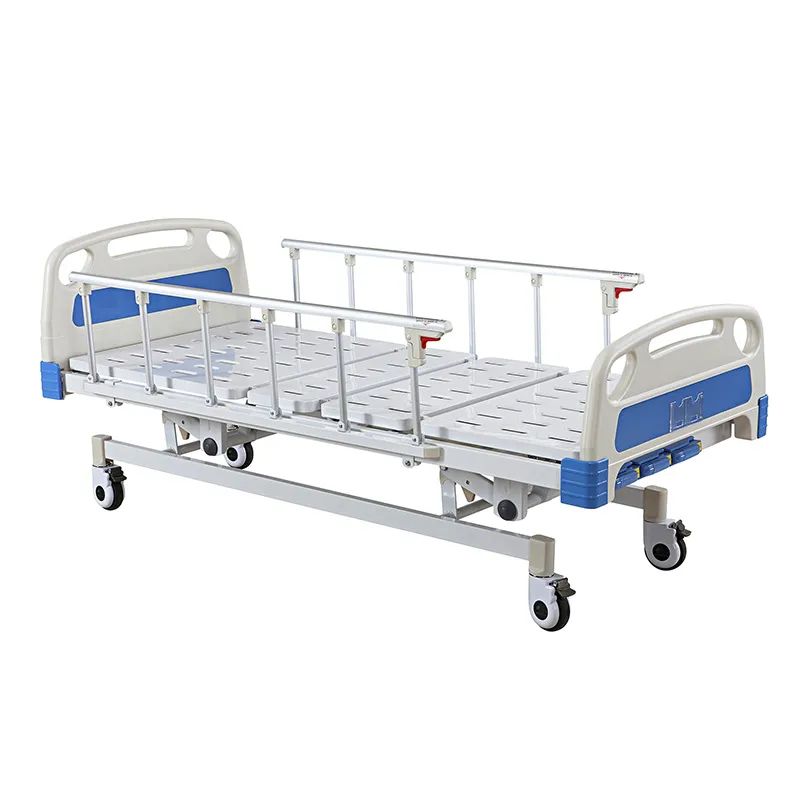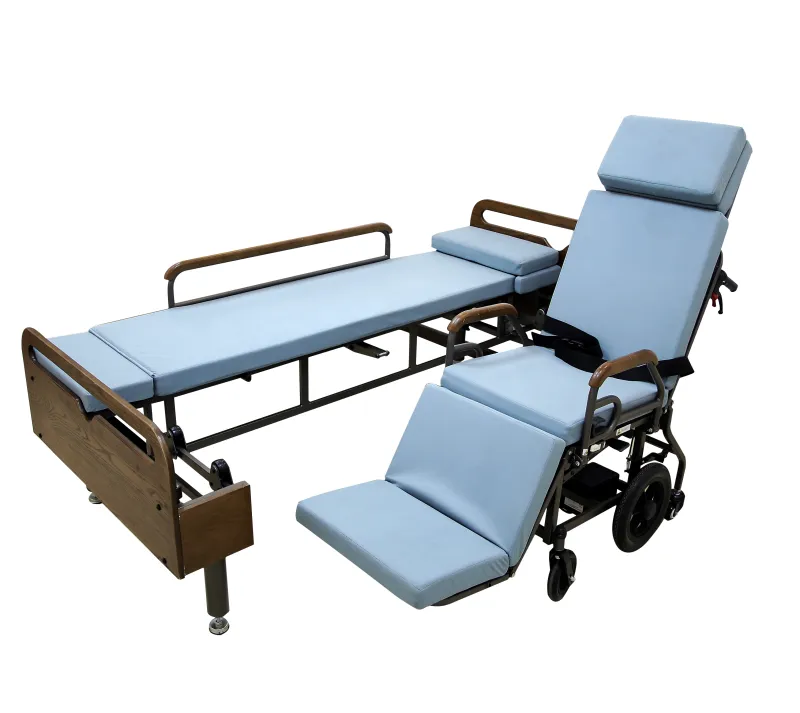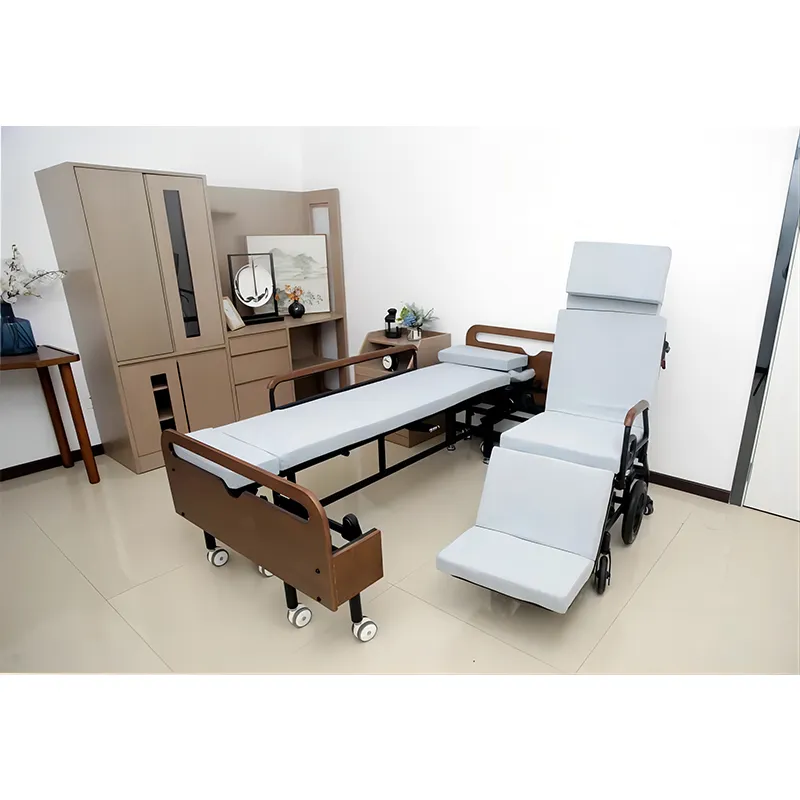
How Can Hospital Beds Help People with Fibromyalgia?
2024-10-25 15:30
Lying down in a comfortable bed and resting for a while should be a moment of relaxation and rejuvenation. However, for people with fibromyalgia, lying down does not necessarily mean relief. In fact, sleep and rest can be the most difficult part of their daily challenges.
In this news article, we will explore the nature of fibromyalgia, what causes this disease, its impact on the body and sleep, and how hospital beds can provide important help for people with fibromyalgia.

What is fibromyalgia?
Fibromyalgia is a chronic disease that mainly manifests as widespread musculoskeletal pain throughout the body, accompanied by fatigue, sleep problems, memory loss and mood disorders. People with fibromyalgia often feel a persistent pain that cannot be explained by specific medical tests and is often misunderstood and ignored. Although the specific cause of fibromyalgia is still unknown, research shows that it is related to how the brain processes pain signals.
Fibromyalgia is more than just a simple pain symptom. It affects the daily life of patients, including work, social life and rest. Due to the complexity and elusive nature of the pain, fibromyalgia is often misdiagnosed as other conditions, such as arthritis or depression. Therefore, raising awareness about fibromyalgia is crucial for patients and their families.
What causes fibromyalgia?
The exact cause of fibromyalgia is not completely understood, but research suggests that a variety of factors, including genetics, infection, trauma, or emotional stress, may be involved. Here are some of the factors that are thought to cause or trigger fibromyalgia:
Genetic factors
Fibromyalgia may have a genetic predisposition. People with a family history of fibromyalgia or other chronic pain syndromes are at higher risk. This suggests that genes may play a role in determining whether a person is susceptible to the disease.
Infections
Certain infections may trigger or worsen the symptoms of fibromyalgia. For example, viral or bacterial infections may trigger an overreaction of the immune system, leading to chronic pain and fatigue. Although this connection is not fully understood, infections do play a role in the development and progression of fibromyalgia.
Trauma
Physical or emotional trauma may also be a trigger for fibromyalgia. A car accident, fall, or other serious physical injury may trigger a long-lasting pain response. In addition, severe psychological trauma, such as the loss of a loved one or experiencing severe stress, may also lead to fibromyalgia.
Emotional stress
Long-term emotional stress, such as anxiety, depression, or chronic stress, may increase the risk of fibromyalgia. Stress not only affects the function of the brain, but it may also cause an inflammatory response in the body, which may further aggravate pain symptoms.
Central nervous system abnormalities
Research shows that fibromyalgia may be related to how the brain processes pain signals. The patient's brain may mistakenly amplify pain signals, causing mild stimulation to be perceived as severe pain. This central nervous system abnormality may be an important pathological mechanism of fibromyalgia.
How does fibromyalgia affect the body?
The most notable feature of fibromyalgia is systemic, persistent pain. This pain is often described as a deep, stabbing or burning sensation that spreads throughout the body. The intensity and location of the pain may vary depending on the time of day, weather, or stress level. Many people with fibromyalgia experience morning stiffness, especially in the joints and muscle areas. This stiffness is usually the worst in the morning and may ease as the day progresses, but it still affects the patient's ability to move.
Fibromyalgia patients also often feel extremely tired and lack energy even after getting enough sleep. This fatigue is not only physical, but can also affect the psychological and emotional state, making patients feel frustrated and helpless. Despite the intense fatigue, many fibromyalgia patients have difficulty getting a good night's sleep. Frequent pain or discomfort during sleep can cause multiple awakenings during the night and difficulty falling into a deep sleep. This sleep disorder further exacerbates daytime fatigue, forming a vicious cycle.
Fibromyalgia patients often report "brain fog", which manifests as memory loss, difficulty concentrating, and difficulty making decisions. This decline in cognitive function can affect daily life and work efficiency. Long-term pain and fatigue may cause fibromyalgia patients to develop emotional disorders such as anxiety and depression. Emotional problems not only aggravate physical symptoms, but can also make patients feel isolated and helpless, further affecting their quality of life.

How does fibromyalgia affect sleep?
Fibromyalgia affects sleep in many ways. Pain, anxiety, and discomfort can interfere with sleep quality, making it difficult for patients to fall asleep or stay asleep. Here are some specific ways fibromyalgia can affect sleep:
Difficulty falling asleep
Due to the pain and discomfort, fibromyalgia patients often have trouble finding a comfortable sleeping position. This can lead to long periods of tossing and turning, making it difficult to fall asleep.
Frequent waking up
Even if they are able to fall asleep, many patients wake up multiple times during the night due to pain, stiffness, or anxiety. This frequent interruption makes it difficult for patients to enter a deep sleep, which seriously reduces the quality of sleep.
Light sleep
Fibromyalgia patients often have a shallow sleep that is easily interrupted by external noises or physical discomfort. This shallow sleep does not provide enough recovery for the body, so patients still feel tired when they wake up in the morning.
Sleep apnea
Some fibromyalgia patients may also experience sleep apnea syndrome, a disease in which breathing is briefly interrupted during sleep. This apnea further disrupts sleep quality and may lead to more serious health problems.

How can hospital beds help fibromyalgia patients?
Hospital beds are usually equipped with a variety of adjustment features, such as adjusting the height of the bed, the angle of the head and feet, etc. These features can help patients find the most comfortable sleeping and resting position and reduce physical pain and discomfort. People with fibromyalgia may experience pain and discomfort in various parts of their body. Hospital beds have specially designed mattresses that provide even support throughout the body and reduce pain by preventing excessive pressure on specific areas.
Due to pain and stiffness, people with fibromyalgia may have difficulty moving during the night. The electric adjustment feature of hospital beds can help people change positions easily, making nighttime movement less stressful and reducing pain caused by improper posture. It is important for people with fibromyalgia to feel safe and comfortable. The guardrails and mattress design of hospital beds can provide an extra sense of security and reduce pain caused by accidental falls or movement.
By adjusting the height and angle of the bed, hospital beds can help people with fibromyalgia find the most comfortable sleeping position, thereby improving sleep quality. Good sleep is essential for pain relief, recovery, and overall health.
Are adjustable beds good for fibromyalgia?
For people with fibromyalgia, adjustable beds can significantly improve comfort and quality of life. Every person with fibromyalgia experiences pain and discomfort that is unique. Adjustable beds allow patients to adjust the height of the bed, the angle of the head and feet to suit their needs, so they can find the most comfortable position and reduce pain.
Adjustable beds can reduce pressure on specific areas by changing the angle of the bed, especially those areas that are prone to pain, such as the back, shoulders and hips. By taking the burden off these pressure points, patients can experience less pain and discomfort. Frequent waking and moving during the night is a common problem for people with fibromyalgia. The electric function of an adjustable bed allows patients to easily change positions, reducing the pain and discomfort caused by nighttime movement.
Adjustable beds can also help patients raise the position of their legs and upper body to improve blood circulation. This is especially important for patients who are bedridden for a long time or have limited mobility, helping to reduce edema and pain caused by poor blood circulation.

How can I help someone with severe fibromyalgia?
Helping someone with severe fibromyalgia requires patience, understanding and support. People with fibromyalgia may feel isolated, frustrated and helpless. Listening to their feelings and showing that you understand and care is very important for their mental health.
Due to pain and fatigue, people with fibromyalgia may have difficulty completing daily activities. Helping someone with fibromyalgia with chores, shopping, or other daily tasks can ease their burden and improve their quality of life. Symptoms for people with fibromyalgia can be alleviated by living a healthy lifestyle. For example, encouraging moderate exercise, a balanced diet, and good sleep habits can help reduce pain and fatigue.
If you're unsure how to best help someone with fibromyalgia, consider talking to a doctor or physical therapist. They can provide professional advice and treatment options to help people manage their symptoms.
Will you end up in the hospital for fibromyalgia?
Fibromyalgia itself doesn't usually lead to hospitalization, but severe symptoms or complications from it may require hospitalization. For example, severe depression, extreme fatigue, or other health problems caused by fibromyalgia may require inpatient monitoring.
In some cases, people may need to be hospitalized for more intensive treatment or symptom management. This may include adjusting medications, receiving physical therapy, or counseling. However, for most people with fibromyalgia, symptoms can usually be effectively managed at home with appropriate home care, medication management, and lifestyle adjustments, without the need for hospitalization.








